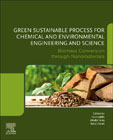
Biomass Conversion through Nanomaterials: Green Sustainable Process for Chemical and Environmental Engineering and Science (GSPCEES)
Altalhi, Tariq
Iqbal, Jibran
Inamuddin
Biomass Conversion through Nanomaterials: Green Sustainable Process for Chemical and Environmental Engineering and Science (GSPCEES) presents the catalytic processing of biomass to produce fuels as well as chemicals. The book employs diverse monomers including glucose/fructose as well as polymers such as starch/cellulose in various catalytic processes. It shows that nanomaterials with porous structures, with increased surface areas, and acidity strengthen the catalytic roles as well as that numerous additional nanomaterials with comparable qualities, such as those based on carbon, resins, metal oxides, zeolites, silica, organic polymers, and many others, enhance the bioconversion processes of biomass. The book also highlights the importance of nanotechnology in the emergence of successful biomass for producing high-quality bioenergy and thoroughly covers varied bioenergy applications using nanomaterials. It highlights the possibility that enabling biomass through nanomaterials improves the effectiveness of various bioenergy sources, such as biofuels, microbial fuel cells, etc. After reading the book you gained a better understanding of biomass conversion using nanomaterials, its associated technologies, and its various applications. Provides a broad overview of biomass conversion using nanomaterialsIncludes in-depth and detailed literature analyses on biomass conversions through nanomaterialsDiscusses a wide range of biomass conversions for producing high-quality bioenergy INDICE: 1. Biomass conversion using nanomaterials: Past and Present Trends2. Role of nanomaterials in biorefineries3. Nanomaterials in the pre-treatment of biomass4. Nanomaterials-based biotechnology in the biomass processing5. Analysis of biomass-derived components through nanomaterials6. Nano-catalytic methodologies for biomass conversion into gaseous/liquid fuels7. Nanomaterials based catalytic conversion of biomass8. Prospects of biomass thermochemical conversions9. Nanomaterials enable biological/physical conversions of biomass10. Evaluating effects of various nano-additives on biodiesel fuels11. Porous nanomaterials based green catalysts of biomass conversion12. Heterogeneous photocatalytic nanomaterials for biomass conversion13. Carbon based nanomaterials for biomass conversion14. Functionalized nanomaterials for biomass conversion15. Nano-catalysed production of biodiesel using microalgae16. Overview of biofuel production methods using metal oxide nano catalysts17. Plant-biomass-based materials for sustainable energy18. Cellulose nanoparticles for sustainable applications19. Lignin nanoparticles for eco-friendly applications20. Pre-treatment of lignocellulosic biomass with nanomaterials21. Nano-catalysts in the production of biodiesel from biomass22. Nanomaterials for Microalgal Biomass processing into fuels23. Nanomaterials in the fermentation of bio-ethanols and biobutanols24. Possibilities and forecast for nanomaterials in the future biorefineries25. Limitations and Future trends for Biomass conversion through nanomaterials
- ISBN: 978-0-443-24748-4
- Editorial: Elsevier
- Encuadernacion: Rústica
- Páginas: 350
- Fecha Publicación: 01/02/2025
- Nº Volúmenes: 1
- Idioma: Inglés
